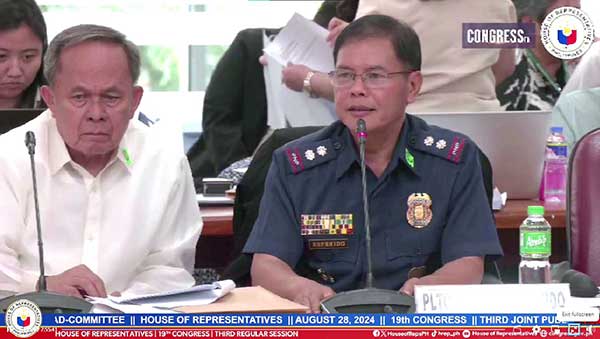
By Jennifer P. Rendon
Did controversial police Lt. Colonel Jovie Espenido just refute claims that Iloilo is the most “shabulized” city as earlier declared by former President Rodrigo Duterte?
During the House of Representatives quad-committee hearing on Wednesday, August 28, Espenido testified on the Duterte administration’s war on illegal drugs.
Rep. Joseph Stephen Paduano of the Abang Lingkod Party-list noted that before Espenido was assigned to the Bacolod City Police Office (BCPO), he passed through Iloilo City.
This move, Paduano said, caused concern for the family of then-Mayor Jed Patrick Mabilog.
He added that on the day Espenido’s assignment was announced, Mabilog’s wife, Ma. Victoria, flew out of the country. At that time, Mabilog was abroad for an official engagement.
The former mayor was last seen publicly in Iloilo in late August 2017 before attending a conference on disaster management in Japan from August 31 to September 4. It is believed that the Mabilog family eventually in North America.
Reports circulated that Espenido would be assigned to the Iloilo City Police Office (ICPO), but this did not materialize. Instead, he was eventually assigned to the BCPO in October 2019.
During the hearing, Paduano asked Espenido if his presence in Iloilo City was due to an assignment to eliminate a drug syndicate, which included targeting Mabilog.
“Nag gawa ako ng investigation sa Iloilo and really, I found out na hindi from Iloilo ang source ng drugs, from Bacolod. Kaya pagkatapos ng Iloilo, pinapunta na ako ng Bacolod,” Espenido told the committee.
(I conducted an investigation in Iloilo, and I really found out that the source of the drugs is not from Iloilo, but from Bacolod. So after Iloilo, I was sent to Bacolod.)
When asked who authorized him to investigate in Iloilo when his assignment was at BCPO, Espenido pointed to former Police Regional Office (PRO) 6 director, retired Brigadier General Rene Pamuspusan.
However, Espenido said it was just a verbal instruction, which he noted was unusual for an organization like the PNP. Still, he justified his actions, saying that as a junior officer, he had to comply.
Paduano remarked that Espenido’s supposed assignment in Iloilo had frightened and threatened Mabilog’s life. He also pointed out that then-President Rodrigo Duterte publicly berated Mabilog and even accused the latter as a drug protector.
Paduano suggested that Mabilog should be invited to appear before the committee, following legal processes.
It is worth noting that Mabilog, his wife, and their two children have not been seen in Iloilo City since Duterte publicly made threats against him.
The situation escalated with Espenido’s supposed assignment to Iloilo City in August 2017, which did not push through.
Espenido eventually left the Ozamiz City Police Station and was assigned to the BCPO effective October 4, 2019.
Before he could assume the BCPO drug czar post in late October 2019, there were claims that his assignment was a political accommodation.
Reports suggested he exited the Ozamiz City Police Station following a dispute with local elective officials.
Despite the controversy, Espenido led the BCPO City Drug Enforcement Unit.
By the end of 2019, BCPO emerged as the top-performing police office in Western Visayas in anti-illegal drug operations and the volume of drugs confiscated.
Records showed that BCPO seized ₱73,031,459.20 worth of illegal drugs from January to December 2019, including 6,083.026 grams of shabu valued at ₱72,996,312 and 152.8139 grams of marijuana worth ₱35,147.20.
However, Espenido’s contribution to these accomplishments has been questioned.
A reliable source stated that Espenido only led two anti-illegal drug operations in January 2020, with both main targets evading arrest.
One of the operations resulted in the confiscation of around 10 grams of suspected shabu.
Espenido was relieved of his post in February 2020, along with 14 other officers holding the rank of police lieutenant colonel.
As of April 1, 2024, Espenido is on floating status at the Police Regional Office 8.
QUOTAS AND REWARDS
Espenido also confirmed the existence of a quota and reward system during the Duterte administration’s war on drugs.
According to Espenido, police officers were required to meet daily quotas of 50 to 100 drug-related operations, and a reward of P20,000 was offered for every drug-related kill.
“I confirm that there was a quota and reward system in the implementation of the war on drugs during the previous administration. I truly wanted to implement it without causing deaths,” Espenido claimed in his affidavit presented to the committee.
Espenido explained that the quotas were interpreted as directives to conduct operations on 50 to 100 households suspected of drug involvement each day.
He also disclosed that the reward money was allegedly sourced from operators of Small-Town Lottery (STL) or jueteng lords and distributed to various police commanders, from regional to provincial levels.
Both the officers involved in the operation and the individuals who carried out the kills were recipients of the reward.
“The STL money is remitted directly to the RD or PD. The same goes for the so-called vigilantes. The flow of money was automatic,” Espenido elaborated, shedding light on the mechanics behind the controversial anti-drug campaign.
Despite his involvement in the operations, Espenido expressed his sorrow over the corruption that infiltrated the system.
He lamented that while the intended targets were drug users and pushers, the rewards system was exploited by corrupt officers looking to advance their careers or line their pockets.
“Alam ng mga pulis lahat iyon na ‘pag patayin, may reward. Kung mamatay ‘yung nasa watchlist, may reward system ‘yun na ibibigay,” Espenido rsaid.
Espenido, who served in key locations such as Albuera and Bacolod, emphasized that during his tenure, no deaths occurred as he aimed to encourage suspects to surrender and undergo rehabilitation.
The rewards his stations received were reportedly used to fund further operations, rather than for personal gain.



















